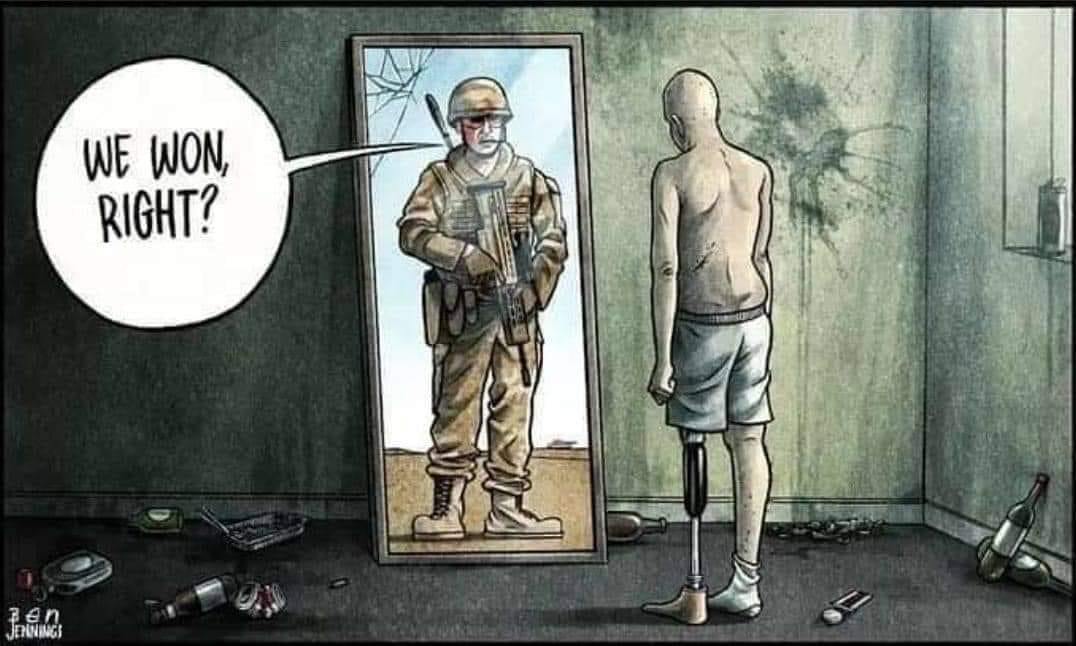
Post-Traumatic Stress Disorder (PTSD) is a mental health condition that affects millions of individuals worldwide. However, it has a particular impact on veterans who have experienced the rigors and traumas of military service.
Trauma Responses
Trauma responses are a combination of emotional, psychological, and physiological reactions that occur following a traumatic event. The three most common trauma responses are “fight, flight, or freeze”.
Fight or Flight: The Body’s Survival Mode
The “fight or flight” response prepares the body to respond to perceived threats. When someone encounters danger, their body releases stress hormones like adrenaline and cortisol. These hormones increase heart rate, sharpen senses, and redirect blood flow to vital organs, helping the person to either confront the threat (fight) or escape from it (flight) . This may be good when on patrol in the deserts of Afghanistan, but what happens when what used to help us starts to hurt us?
Freeze: When the Mind Shuts Down
The “freeze” response is another common trauma response. In the face of danger, we may go into a state of shock where the mind and body become temporarily frozen. This is the reason dissociation is common in individuals with PTSD.
Common Presentations of PTSD in Veterans
Recurring Traumatic Memories:
One of the commonly known symptoms of PTSD is reliving traumatic memories. Veterans may experience vivid flashbacks, nightmares, and intrusive thoughts related to their military experiences. These memories can make it difficult to concentrate, sleep, or engage in day to day life.
Hyper-Arousal and Hypervigilance:
Veterans with PTSD often live in a state of constant hyper-arousal. They are often on high alert and scanning their environment for potential threats. This hyper-vigilance can lead to heightened anxiety, irritability, and difficulty relaxing.
Emotional Numbing:
Many veterans with PTSD may find it challenging to experience positive emotions or to connect with loved ones emotionally. This emotional distancing can harm relationships and contribute to feelings of isolation.
Avoidance Behavior:
In an effort to cope with their distressing memories and emotions, veterans may engage in avoidance behavior. This can include avoiding reminders of their military service, such as crowds, loud noises, or even certain places.
Substance Abuse:
Some veterans turn to substance abuse as a way to self-medicate their PTSD symptoms. This can lead to a dangerous cycle of addiction, further complicating their mental health struggles.
Physical Health Implications:
PTSD can have a drastic impact on physical health. The chronic stress associated with the disorder can weaken the immune system and increase the risk of cardiovascular issues.
Relationship Strain:
PTSD can put a significant strain on relationships, both with intimate partners and family members. The emotional distance, mood swings, and patterns of avoidant behavior can create tension and misunderstanding.
Employment and Financial Challenges:
Veterans with PTSD may face difficulties in maintaining steady employment due to their symptoms. This can lead to financial instability and increased stress, significantly increasing the risk of homelessness.
High Risk of Suicide:
Perhaps the most tragic consequence of PTSD is the increased risk of suicide among veterans. VA statistics estimate that around 22 veterans a day fall victim to the war at home.
Substance Use as Self-Medication for Unresolved Trauma
For some individuals with PTSD, the strong emotions associated with trauma can become unbearable. As a result, they may turn to substances such as alcohol, drugs, or prescription medications as a way to cope with their pain. Substance use can temporarily numb emotional pain, reduce anxiety, and provide a sense of relief. Essentially, it is putting “band-aids on bullet holes”. Using substances to manage trauma-related symptoms is a double-edged sword which usually results in a cycle of addiction.
Moving Forward: Healing Unseen Wounds
Understanding the complex impact of PTSD on veterans is essential for providing them with the help and support they deserve. Veterans carry the weight of their service experiences long after they return home, and it’s important that society recognizes their struggles.
Veterans dealing with PTSD should know that they are not alone. As a society, it is our responsibility to make sure that veterans have access to the care they need to overcome the silent battle of PTSD. Together, we can help individuals heal and reclaim their lives from the chains of PTSD and addiction.
If you know a veteran who is struggling, please encourage them to reach out to Homefront Healing and discover how they can begin to heal from past hurt.
